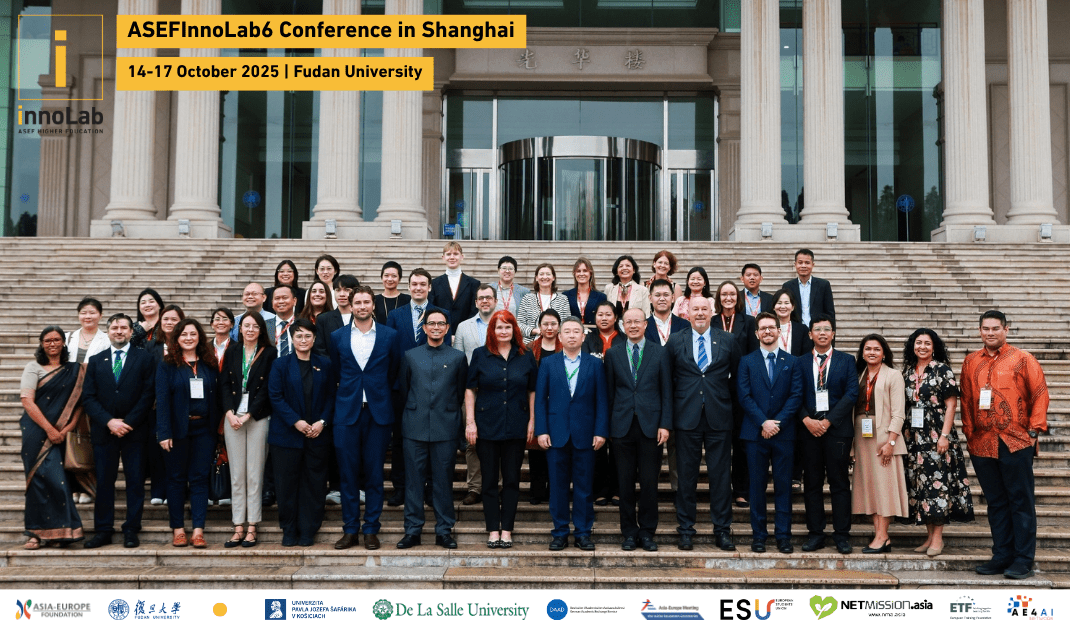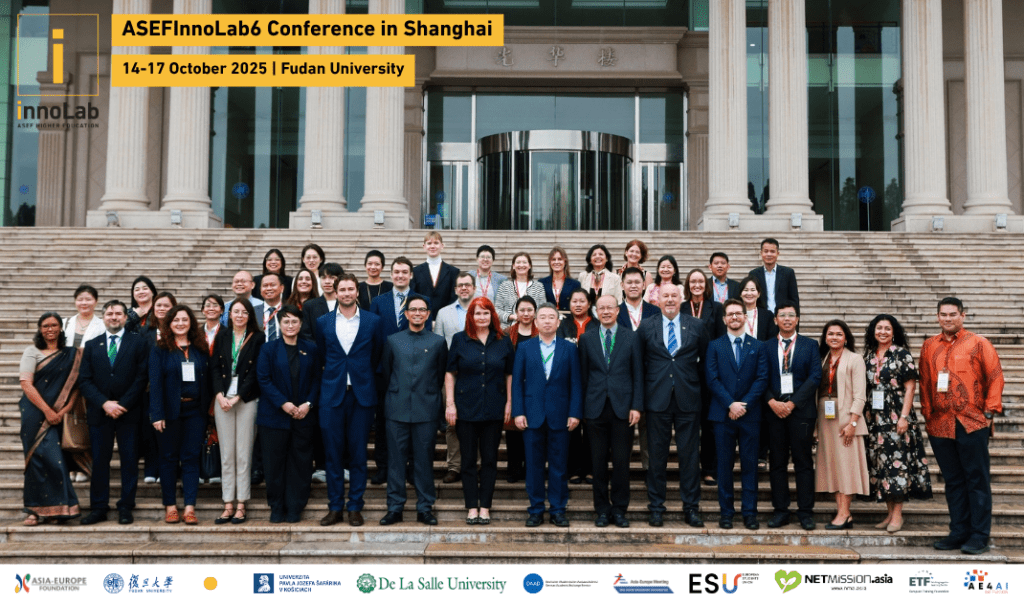Co-organised by ASEF and Fudan University, the 6th ASEF Higher Education Innovation Laboratory (ASEFInnoLab6) Conference in Shanghai convened 30 academics and researchers from across Asia and Europe for a week of research-intensive collaboration on AI skills, governance, and institution-wide transformation.
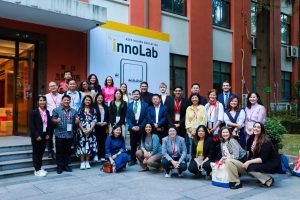
A strong opening day that set the tone for action
The Opening Session on Day 1 welcomed an intercultural and intergenerational audience made up of our main cohort of academics and researchers, consular officials, and exchange students at Fudan University. It set the tone for a dynamic week ahead, with Mr ZHANG Lei, Deputy Executive Director of ASEF, and Professor CHEN Zhimin, Vice President of Fudan University, welcoming participants and reaffirming the strong Asia-Europe collaboration behind this initiative.
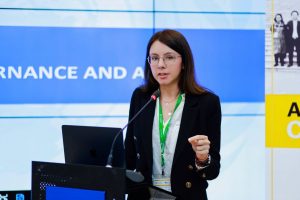 The session continued with two insightful keynote addresses:
The session continued with two insightful keynote addresses:
- Ms Anja GENGO (Internet Governance Forum) shared the IGF’s work and explored emerging global frameworks relevant to AI. Her message underscored the importance of multistakeholder collaboration and academic engagement in ensuring AI serves humanity, equity, and sustainability.
- Professor SHEN Yi (Fudan University) highlighted the importance of multilateralism and international cooperation in AI governance and the challenges of preserving value systems as governments and other sectors navigate issues surrounding AI.
In addition to these incredible speakers, we were pleased to welcome esteemed representatives from the consulates of Austria, Australia, Cambodia, Czech Republic, Hungary, Indonesia, Malaysia, Malta, Slovenia, Switzerland, and Thailand.
A research-intensive programme with peer review at its core
Throughout the week-long conference, teams presented their developing academic papers—sparking rich, interactive discussions on how universities across Asia and Europe are shaping the future of skills development in the age of AI.
- Dr Nurkhamimi Zainuddin (Universiti Sains Islam Malaysia), Ms Julia Mironova (ISMA University of Applied Sciences), and Dr Myagmarsuren Orosoo (Mongolian National University of Education) presented “Assessing Future Skills for the Age of AI Among Higher Education Students in Europe and Asia.” Their team’s work explores generative AI literacy and future-ready competencies among higher education students across both regions.
- Dr Juvy Lizette Gervacio (UP Open University), Mr Mokhammad Ardafillah (House of Representatives of the Republic of Indonesia), Dr Maria Čikešová (Slovak Rectors’ Conference), and Dr Chanintorn Pensute (Chiang Mai University) shared insights from their paper “Crafting the Rules of Intelligence: Some Policy Insights on University Policies on AI from Asia and Europe.” Their research highlights how universities can design effective and equitable AI governance frameworks that keep pace with rapid technological change.
- Ms Sara Ciabattoni (Open Institute of Technology), Dr Oliver Belarga (Kansai University), Dr Win Yu Khaing (University of Yangon), and Dr Laiza Limpin (Mindanao State University – General Santos City) presented “Developing Culturally Responsive Guidelines for Ethical AI Competence in Higher Education: A Comparative Study Across Asia and Europe.” Their study examines how universities engage with AI ethics with the aim of informing guidelines that support universities in this area.
- Mrs Elizabeth Kasa-Malksoo (University of Tartu), Mrs Claudia Muellauer (Central European University), Dr Muhamad Alif Haji Sismat (Universiti Islam Sultan Sharif Ali (UNISSA)), and Dr Anamika (Indus Training and Research Institute) shared their draft titled “From Principles to Policy: Towards a Rights-based Framework for Ethical AI Governance in Higher Education,” which explores how ethical principles and human rights standards can be translated into enforceable institutional policies
- The draft paper on “Developing Inclusive Ethical AI Guidelines to Support Diverse Learners with Disabilities in Higher Education Institutions in Asia and Europe” was presented by Dr Munir Sewani (Sindh Madressatul Islam University), Dr Marcelino Lunag, Jr (Saint Louis University), Mrs Akrati Jain (Holmesglen Institute), Dr Shalinka Jayatilleke (La Trobe University), and Dr Silvester Krčméry (Comenius University in Bratislava). This research aims to ensure AI inclusion and accessibility for learners of all abilities.
- Dr Hang Ngo (Thang Long University) and Dr Rozanne Tuesday Flores (Bukidnon State University) shared their work “Multilingual AI in Universities: Advancing Inclusion Through Universal Acceptance and Stakeholder Insights.” The paper highlights how multilingual AI tools can advance inclusion and promote equitable access to education across linguistic and cultural boundaries.
- Ms Zane Šime (Norwegian University of Science and Technology) and Dr Ronn Concepcion II (De La Salle University) presented their team’s developing paper, “Becoming a Quality-Driven and Sustainable AI-Enabled Institution: A Systematic Policy-Practice Review and Roadmap.” Their study examines how universities across Asia and Europe are adopting institutional strategies and governance approaches for responsible, institution-wide AI integration.
Thought-provoking learnings from an incredible lineup of keynotes
Supplementing the opening day’s keynotes, we also heard informative and thought-provoking talks from experts and scholars working in the intersection of AI and higher education:
 Prof Dr Carlos Delgado KLOOS, UNESCO Chair on Scalable Digital Education for All (Universidad Carlos III de Madrid), delivered a comprehensive and stimulating keynote on Day 2 titled “Adapting to the Intelligence Age: The New Literacy for Universities,” where he shared insights on how higher education must evolve from the Information Age to the Intelligence Age.
Prof Dr Carlos Delgado KLOOS, UNESCO Chair on Scalable Digital Education for All (Universidad Carlos III de Madrid), delivered a comprehensive and stimulating keynote on Day 2 titled “Adapting to the Intelligence Age: The New Literacy for Universities,” where he shared insights on how higher education must evolve from the Information Age to the Intelligence Age.
Day 3 started with a keynote by Prof TANG Weiqi (Fudan University / Shanghai Institute of Energy and Carbon Neutrality Strategy) on “Augmenting Academic Capacity with AI Tools.” Prof Tang described this as a moment of profound transformation—a remarkable opportunity to rethink what kinds of research and collaboration universities must lead in the age of AI. He underscored AI’s unique role as a translator between disciplines and a catalyst for innovation that can address today’s interconnected global challenges.
The conference’s last day began with an eye-opening keynote by Dr JIANG Tianjiao (Fudan University), who offered a comprehensive overview of global AI developments and China’s growing efforts in AI application. He spotlighted Fudan University’s AI for Science (AI4S) Initiative, which advances talent development and the creation of high-quality research databases.
Impactful learning and peer-to-peer exchanges—the InnoLab way
Beyond the paper presentations, participants also took part in enriching sessions that broadened the learning experience:
On Day 1, a Special Panel Discussion on Enhancing Global AI Governance through Capacity Building, part of the FDU Rongchang Lecture Series, featured Prof LU Chuanying (Tongji University), Prof CAI Cuihong (Fudan University), and our guest keynote Ms Anja GENGO (United Nations Internet Governance Forum), who underscored the need for inclusive, globally coordinated action to bridge AI divides and ensure all societies benefit equitably from the AI era.
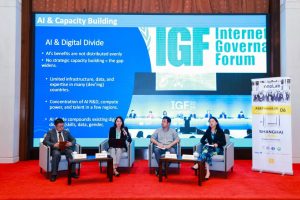
A site visit to SenseTime happened on Day 2, which gave our cohort and Fudan University students a first-hand look at the company’s cutting-edge AI technologies and education applications, and its internationalisation strategy. On the last day, our cohort also visited the Shanghai Academy of AI for Science—a hub where interdisciplinary teams of scientists and experts harness AI to accelerate scientific discovery and industrial innovation.
The programme also included stimulating exchanges led by Dr Claudio RIVERA (RTU Riga Business School), Strategic Advisor of ASEFInnoLab6, on principles and priorities for researching the transformation of universities in the age of AI.
This packed week ended with an induction ceremony that officially welcomed them into the growing Asia-Europe for Artificial Intelligence AE4AI Network.
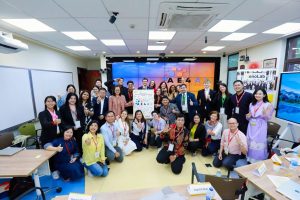
A huge thank you to our partner and host, Fudan University, our esteemed resource persons, dedicated volunteers, and of course, our incredible cohort of participants whose curiosity, collaboration, and commitment made this conference truly exceptional!

